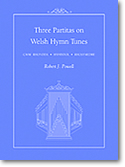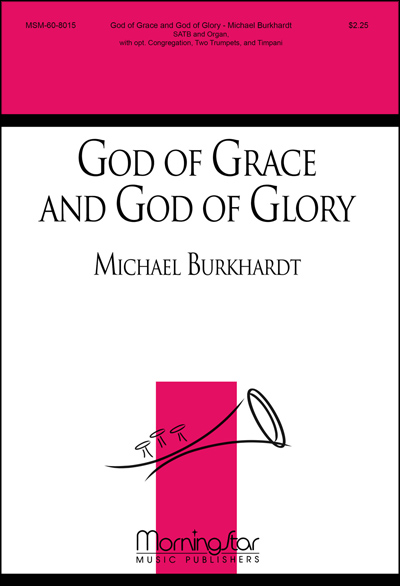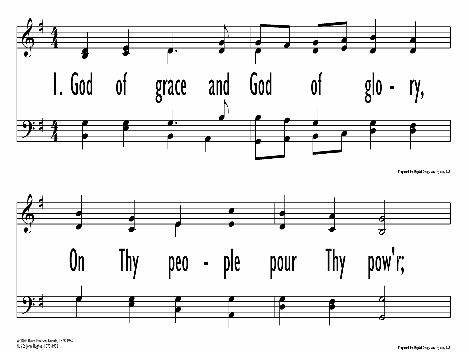- |
User Links
God of Grace and God of Glory

God of grace and God of glory
Author: Harry Emerson Fosdick (1930)Tune: CWM RHONDDA
Published in 154 hymnals
Printable scores: PDF, MusicXMLPlayable presentation: Lyrics only, lyrics + musicAudio files: MIDI, Recording
Representative Text
1 God of grace and God of glory,
on your people pour your pow’r;
crown your ancient Church’s story,
bring its bud to glorious flow’r.
Grant us wisdom, grant us courage
for the facing of this hour,
for the facing of this hour.
2 Lo, the hosts of evil round us
scorn the Christ, assail his ways.
From the fears that long have bound us
free our hearts to faith and praise.
Grant us wisdom, grant us courage
for the living of these days,
for the living of these days.
3 Cure your children’s warring madness;
bend our pride to your control;
shame our wanton, selfish gladness,
rich in things and poor in soul.
Grant us wisdom, grant us courage
lest we miss your kingdom’s goal,
lest we miss your kingdom’s goal.
4 Save us from weak resignation
to the evils we deplore;
let the gift of your salvation
be our glory evermore.
Grant us wisdom, grant us courage
serving you whom we adore,
serving you whom we adore.
Source: Christian Worship: Hymnal #770
Author: Harry Emerson Fosdick
 Born: May 24, 1878, Buffalo, New York.
Died: October 5, 1969, Bronxville, New York.
Fosdick attended Colgate University, Union Theological Seminary, and Columbia University. Ordained in 1903, he pastored at the First Baptist Church in Montclair, New Jersey, from 1904 to 1915. At Union Theological Seminary, he lectured on Baptist principles and homiletics (1908-1915) and was professor of practical theology (1915-1946). He also found time to serve as associate minister at the First Presbyterian Church in Manhattan, New York (1919-1925), and pastor of Park Avenue Baptist Church (1929-1946). His picture… Go to person page >
Born: May 24, 1878, Buffalo, New York.
Died: October 5, 1969, Bronxville, New York.
Fosdick attended Colgate University, Union Theological Seminary, and Columbia University. Ordained in 1903, he pastored at the First Baptist Church in Montclair, New Jersey, from 1904 to 1915. At Union Theological Seminary, he lectured on Baptist principles and homiletics (1908-1915) and was professor of practical theology (1915-1946). He also found time to serve as associate minister at the First Presbyterian Church in Manhattan, New York (1919-1925), and pastor of Park Avenue Baptist Church (1929-1946). His picture… Go to person page >Text Information
Related Texts
| First Line: | God of grace and God of glory |
| Title: | God of Grace and God of Glory |
| Author: | Harry Emerson Fosdick (1930) |
| Meter: | 8.7.8.7.8.7.7 |
| Language: | English |
| Notes: | French translation: "Dieu de grâce, Dieu de glorie" by F. Augé-Daullé; Spanish translations: See "Dios de amor y Dios de gloria" by Elodia Ayala Sada, "Dios de gracia, Dios de gloria" by Federico J. Pagura |
| Copyright: | Public Domain |
- (hymns)
- (hymns)
- (hymns)
- (hymns)
- (hymns)
- (hymns)
- (hymns)
- (hymns)
- (hymns)
- (hymns)
- (hymns)
- (hymns)
- (hymns)
- (hymns)
- (hymns)
- (hymns)
- (hymns)
- (hymns)
- (hymns)
- (hymns)
- (hymns)
- (hymns)
- (hymns)
- (hymns)
- (hymns)
- (hymns)
- (hymns)
- (hymns)
- (hymns)
- (hymns)
- (hymns)
- (hymns)
- (hymns)
- (hymns)
- (hymns)
- (hymns)
- (hymns)
- (hymns)
- (hymns)
- (hymns)
- (hymns)
- (hymns)
- (hymns)
- (hymns)
- (hymns)
- (hymns)
- (hymns)
- (hymns)
- (hymns)
- (hymns)
- (hymns)
- (hymns)
- (hymns)
- (hymns)
- (hymns)
- (hymns)
- (hymns)
- (hymns)
- (hymns)
- (hymns)
- (hymns)
- (hymns)
- (hymns)
- (hymns)
- (hymns)
- (hymns)
- (hymns)
- (hymns)
- (hymns)
- (hymns)
- (hymns)
- (hymns)
- (hymns)
- (hymns)
- (hymns)
- (hymns)
- (hymns)
- (hymns)
- (hymns)
- (hymns)
- (hymns)
English
- A Calendar of Hymns #d19
- A Hymnal for Friends #59
- A. M. E. C. Hymnal #284
- African Methodist Episcopal Church Hymnal #62
- Ancient and Modern: hymns and songs for refreshing worship #648a
- Ancient and Modern: hymns and songs for refreshing worship #648b
- Anglican Hymns Old and New (Rev. and Enl.) #248
- Assembly Songbook #d22
- At Worship: a hymnal for young churchmen #238
- Australian Hymn Book #543 10 shown out of 111
French
Spanish
Welsh
Tune
CWM RHONDDAThe popularity of Williams's text ("Guide me, O thou great Jehovah") is undoubtedly aided by its association with CWM RHONDDA, composed in 1905 by John Hughes (b. Dowlais, Glamorganshire, Wales, 1873; d. Llantwit Fardre, Wales, 1932) during a church service for a Baptist Cymanfa Ganu (song festival)…
For Leaders
Text:
Harry E. Fosdick was a well-known and controversial preacher in the early twentieth century. After Fosdick left his positon at one church, John D. Rockefeller asked him to become pastor of Park Avenue Baptist Church in New York City, but Fosdick thought the church was too wealthy, and agreed only on condition that a new church would be built in a less fashionable place. The site selected for Riverside Church was on the banks of the Hudson, not far from Harlem. Fosdick wrote this hymn at his summer home in Maine in 1930 for the opening service of Riverside Church that fall. It was sung as the processional hymn for that service on October 5 and again at the dedication service on February 8, 1931. The first publication was in Praise and Service by H. Augustine Smith in 1932.
This hymn is a prayer for God's help for the church to live in God's power and love with generosity and progress toward social justice. Each stanza concludes with a two-line petition for wisdom and courage that was originally meant to be sung to one musical phrase. However, when it is sung to CWM RHONDDA, the final line of each stanza must be repeated to extend the text to fit the tune. This results in a needless repetition of the second part of the petition.
Tune:
CWM RHONDDA is a well-known Welsh tune. It was written in 1907 by John Hughes, a Welshman who spent most of his life as a railway worker. The tune name literally means “Rhondda valley,” after the Rhondda River that flows through a coal-mining district of Wales. This tune has great vigor, and was at first circulated only in leaflet form because hymnal editors considered it too vigorous to be a proper hymn tune. They eventually succumbed to popular pressure, and since the 1930s the tune has been included in many hymnals, often with multiple texts.
Fosdick did not like the use of this tune for his text, having written it specifically to fit the three phrases of the tune REGENT SQUARE. When asked about the tune change, he wrote, “My secretary has already written you the answer to your question about my hymn's divorce from 'Regent Suqare' and remarriage to 'Cwm Rhondda.' The Methodists did it! And both here and abroad they are being followed” (quoted in Hymnal Companion to Evangelical Lutheran Worship, Paul Westermeyer, p. 562).
When/Why/How:
This hymn was written as an opening hymn, and is suitable for a service with a theme of the Church’s role in the world. With the large number of arrangements of this tune, one can easily see why hymnal editors had to yield to popular pressure to include this tune in their hymnals. The frequent use of brass instruments shows off the vigor of the tune.
“God of Grace and God of Glory” is a majestic arrangement for handbells, calling for a variety of techniques and an optional trumpet. The middle section goes to a minor key and is more subdued. A brass solo based on CWM RHONDDA, titled “Guide Me, O Thou Great Jehovah” after the text for which the tune is famous, is available for trumpet, trombone, and tuba. In his setting of “God of Grace and God of Glory,” Joel Raney sets the text to his own original music as well as CWM RHONDDA, employing at a minimum a SATB choir and piano, but with additional optional reinforcement from organ, handbells, trumpets, and percussion. A majestic choral arrangement of “God of Grace and God of Glory” calls for organ, brass quintet, and optional percussion to accompany the congregation and adult and children's choirs. Changing meters in some phrases add vitality and interest.
Tiffany Shomsky, Hymnary.org
Timeline
Arrangements
Media
- MIDI file from Baptist Hymnal 1991 #395
- MIDI file from The Cyber Hymnal #1925
- Audio recording from Evangelical Lutheran Worship #705
- Audio recording from Glory to God: the Presbyterian Hymnal #307
- Audio recording from Lift Up Your Hearts: psalms, hymns, and spiritual songs #926
- Audio recording from Lift Up Your Hearts: psalms, hymns, and spiritual songs #926
- Audio recording from Lift Up Your Hearts: psalms, hymns, and spiritual songs #926
- Audio recording from Small Church Music #7023
- Audio recording from Small Church Music #7023
- Audio recording from The Worshiping Church #669
- Audio recording from The United Methodist Hymnal #577
- Audio recording from Worship and Rejoice #569
- MIDI file from Worship and Rejoice #569
- MIDI file from Worship in Song: A Friends Hymnal #158


 My Starred Hymns
My Starred Hymns








